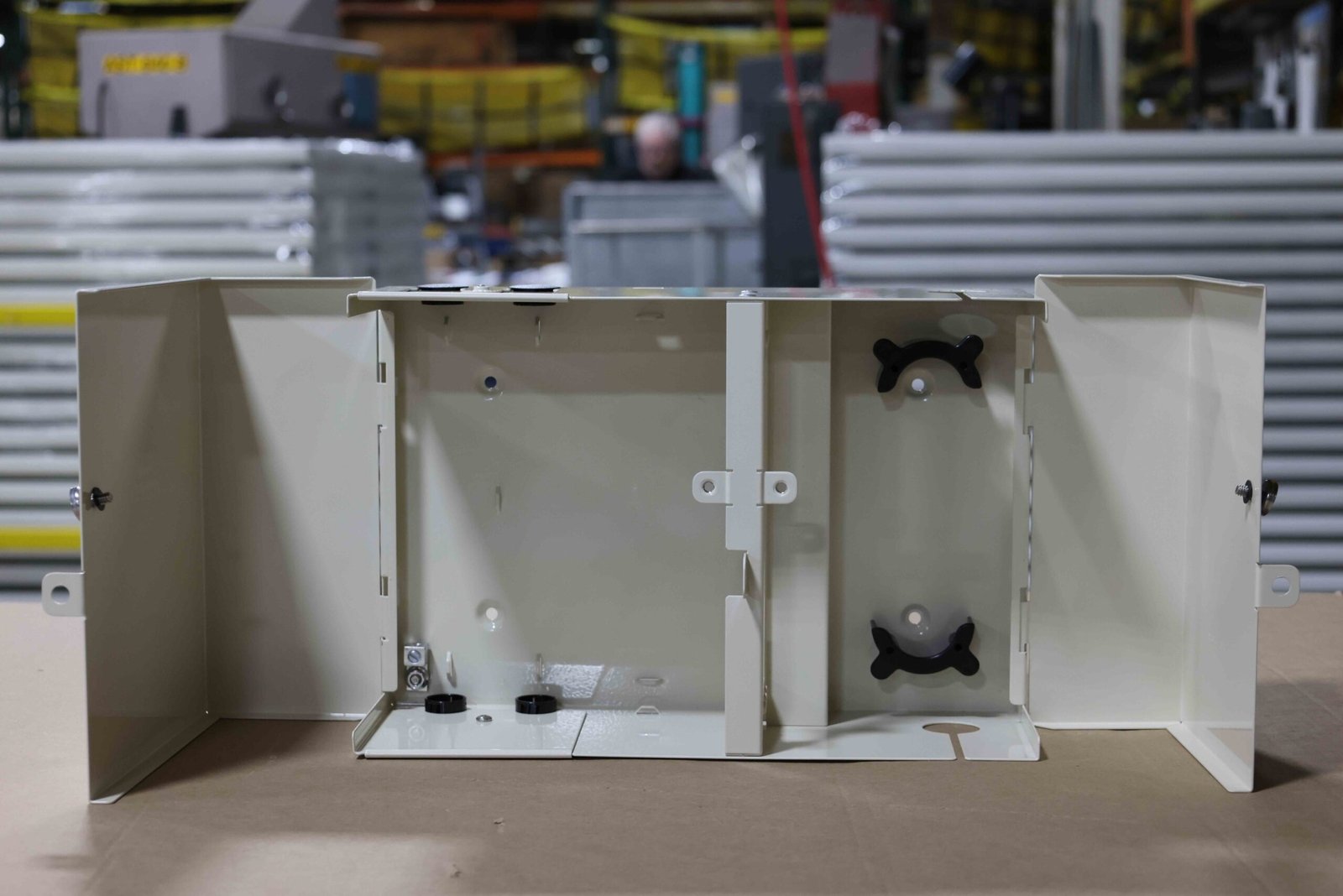Metal box enclosures are critical components in many industries, offering protection and functionality for various equipment and electronics. These enclosures serve as sturdy housings for devices, shielding them from environmental factors and providing a secure space for sensitive components. Their significance spans across industrial settings, electronics, and outdoor applications, highlighting their versatile and essential role. In this article, we will delve into what metal box enclosures are, the different types available, their benefits, and practical applications. By understanding these elements, you can make informed decisions about the best enclosures for your needs.
What is a Metal Box Enclosure?
Definition and Basic Description
A metal box enclosure is a protective casing made from metal, designed to house and safeguard electrical components, machinery, or other equipment. These enclosures are typically constructed from metals such as steel or aluminum, chosen for their durability and resistance to environmental stressors. The primary function of a metal box enclosure is to shield internal components from physical damage, dust, moisture, and other external factors that could impact performance. They come in various sizes and designs, allowing customization to meet specific requirements.
Common Materials Used
The most common materials used in metal box enclosures are steel and aluminum. Steel enclosures are known for their strength and are often used in environments where extra durability is required. They are ideal for industrial settings where heavy-duty protection is necessary. Aluminum enclosures, on the other hand, are lighter and resistant to corrosion, making them suitable for applications where weight is a concern or where the enclosure will be exposed to harsh environmental conditions. Each material has its own set of advantages, and the choice depends on the specific needs of the application.
Types of Metal Box Enclosures
Wall-Mounted Enclosures
Wall-mounted enclosures are designed to be fixed to a wall, providing a compact and space-efficient solution for housing equipment. These enclosures are often used in settings where floor space is limited or where easy access to the equipment is needed. They are commonly found in control rooms, electrical panels, and data centers. Wall-mounted enclosures come in various sizes and configurations, allowing for flexibility in their application. They are typically equipped with mounting brackets and are constructed to offer robust protection against environmental factors and unauthorized access.
Floor-Mounted Enclosures
Floor-mounted enclosures are larger and designed to sit directly on the floor, making them suitable for housing larger equipment or multiple components. These enclosures are often used in industrial settings, such as factories or server rooms, where they can accommodate substantial machinery or electronic systems. They provide ample space and easy accessibility for maintenance and operation. Floor-mounted enclosures are built to endure heavy usage and are often equipped with features such as ventilation and cable management systems to support the efficient functioning of the equipment housed within.
Custom Enclosures
Custom metal box enclosures are tailored to meet specific requirements that standard models may not fulfill. These enclosures are designed based on the unique needs of the application, including size, material, and additional features. Custom enclosures offer flexibility in design, allowing for the inclusion of specific mounting options, ventilation systems, or other specialized elements. They are ideal for situations where off-the-shelf solutions are inadequate. By working with manufacturers or designers, you can create enclosures that perfectly fit your needs, ensuring optimal protection and functionality.
Benefits of Using Metal Box Enclosures
Durability
One of the main advantages of metal box enclosure is their exceptional durability. Metals such as steel and aluminum provide strong protection against physical impacts, making them ideal for safeguarding sensitive equipment in demanding environments. These enclosures can withstand harsh conditions, including extreme temperatures, mechanical stress, and chemical exposure. Their robust construction ensures that the housed components remain secure and functional, even under challenging circumstances. This durability makes metal enclosures a reliable choice for both industrial and commercial applications.
Security
Security is a crucial aspect of metal box enclosures, as they are designed to protect valuable equipment from unauthorized access and tampering. Metal enclosures are equipped with secure locking mechanisms and robust construction, which deter potential intruders and provide a secure environment for sensitive components. This protection is particularly important in settings where equipment is critical to operations or where there is a risk of theft or vandalism. By investing in high-quality metal enclosures, you can ensure that your equipment remains safe and operational.
Heat Dissipation
Heat dissipation is another important benefit of metal box enclosures. Metal enclosures are effective at dissipating heat generated by electronic components, helping to maintain optimal operating temperatures. This is crucial for preventing overheating, which can lead to equipment failure or reduced performance. Many metal enclosures are designed with ventilation options, such as perforated panels or built-in fans, to enhance airflow and heat management. By managing heat effectively, metal enclosures contribute to the longevity and reliability of the equipment they house.
Applications of Metal Box Enclosures
Industrial Settings
In industrial settings, metal box enclosures are essential for protecting machinery, control panels, and other critical equipment. They are used in factories, manufacturing plants, and process facilities to safeguard equipment from dust, moisture, and mechanical damage. Metal enclosures help ensure that industrial operations run smoothly by providing a reliable and durable housing solution. Their ability to withstand harsh conditions and protect valuable equipment makes them a key component in maintaining operational efficiency and safety.
Electrical and Electronics
Metal box enclosures play a vital role in the electrical and electronics industry by housing electrical components, circuit boards, and control systems. These enclosures protect sensitive electronic devices from environmental factors such as dust, moisture, and electromagnetic interference. They also provide a secure and organized space for electrical connections and components, reducing the risk of short circuits and other electrical issues. Metal enclosures are commonly used in electrical panels, junction boxes, and other applications where protection and organization are crucial.
Outdoor Environments
Outdoor environments present unique challenges for equipment protection, and metal box enclosures are well-suited to meet these demands. They are designed to withstand exposure to the elements, including rain, snow, and UV radiation. Metal enclosures used in outdoor settings are often treated with protective coatings or finishes to enhance their resistance to corrosion and weathering. This makes them ideal for applications such as telecommunications equipment, outdoor control panels, and utility boxes. By using metal enclosures, you can ensure that your equipment remains functional and protected in challenging outdoor conditions.
Factors to Consider When Choosing a Metal Box Enclosure
Size and Space Requirements
When selecting a metal box enclosure, it is important to consider the size and space requirements of your equipment. The enclosure must be large enough to accommodate all components, with adequate space for wiring and ventilation. Measuring the dimensions of your equipment and accounting for any additional space needed for maintenance or future expansion will help ensure a proper fit. Choosing the right size enclosure helps prevent overcrowding and ensures that your equipment operates efficiently and safely.
Material Choice
The choice of material for a metal box enclosure depends on the specific environmental conditions and requirements of the application. Steel enclosures offer high strength and durability, making them suitable for heavy-duty applications. Aluminum enclosures, with their lighter weight and corrosion resistance, are ideal for environments where weight and exposure to elements are concerns. Assessing the environmental factors, such as temperature extremes, humidity, and potential chemical exposure, will help you select the most appropriate material for your enclosure.
Compliance and Standards
Ensuring that your metal box enclosure complies with industry standards and regulations is essential for safety and functionality. Different industries have specific standards for enclosure construction, such as NEMA (National Electrical Manufacturers Association) or IP (Ingress Protection) ratings. These standards define the level of protection provided against environmental factors and mechanical impacts. By selecting an enclosure that meets these standards, you can ensure that it provides the necessary protection and complies with regulatory requirements.
Installation and Maintenance Tips
Installation Best Practices
Proper installation of metal box enclosures is crucial for ensuring their effectiveness and longevity. Start by selecting a suitable location that provides stability and accessibility for the enclosure. Ensure that the mounting surfaces are level and secure to prevent any movement or shifting. Follow the manufacturer’s guidelines for mounting and securing the enclosure, and make sure to use appropriate hardware. Proper installation not only enhances the functionality of the enclosure but also contributes to the safety and reliability of the equipment housed within.
Maintenance and Care
Regular maintenance and care are important for extending the lifespan of metal box enclosures. Inspect the enclosure periodically for signs of wear, damage, or corrosion. Clean the enclosure regularly to remove dust and debris that could affect performance. Check the seals and gaskets to ensure they remain intact and effective in preventing ingress of moisture or contaminants. Address any issues promptly to prevent potential problems and maintain the enclosure’s protective capabilities. Routine maintenance helps ensure that your metal box enclosure continues to provide reliable protection for your equipment.
Conclusion
Metal box enclosures are essential components in protecting and housing equipment across various industries. Their durability, security, and heat dissipation capabilities make them a valuable choice for both industrial and commercial applications. By understanding the types of enclosures available, their benefits, and the factors to consider when choosing one, you can make informed decisions that ensure optimal protection and functionality for your equipment. Whether you are selecting an enclosure for a factory, an outdoor environment, or an electronics application, metal box enclosures provide a reliable solution to meet your needs.




